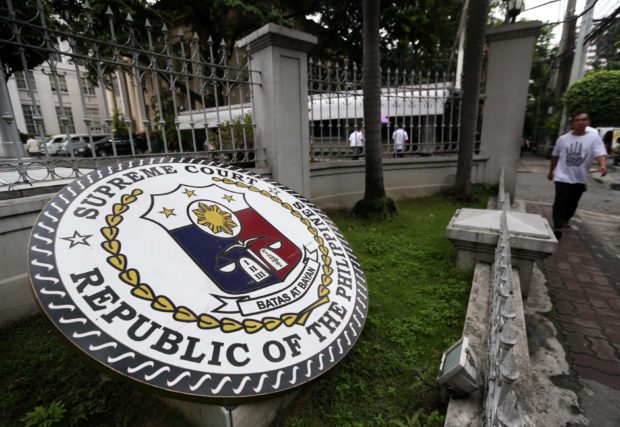
FILE PHOTO: The Supreme Court logo. (INQUIRER/LYN RILLON)
MANILA, Philippines–The Supreme Court has wrapped up the debate on the legality of the no contact apprehension policy (NCAP) with questions on due process rights, the right to privacy of the traffic violators, potential retrenchment of traffic enforcers and traffic law enforcement potentially given to the private sector.
Under the NCAP, CCTV and digital cameras identify and apprehend traffic violators through videos and images of their violations. Once detected, the LGU issues traffic citation tickets and mail them directly to the vehicle’s registered owners.
Non-payment of fines within seven days means that their vehicles will not be accommodated for re-registration.
On data privacy, due process rights
Associate Justice Japar Dimaampao asked Solicitor-General Menardo Guevarra how personal data are protected.
“Only authorized persons coming from the local government units (LGUs) may have direct access to the LTO (Land Transportation Office) database,” Guevarra said, adding that there are confidentiality provisions in the agreement between the LGUs and the LTO.
However, when asked if, when registering before the LTO, the registrant is asked for permission to forward the data to LGUs, he said, “I think the matter of consent is exactly one of the exceptions under the Data Privacy Act.”
Meanwhile, Chief Justice Alexander Gesmundo asked how the personal data of traffic violators are disposed of once the violation has been paid, and none of the respondents could give a categorical answer.
Future of traffic law enforcement
The NCAP, according to the lawyers of the cities that are already implementing it, is a measure to eradicate corruption that will no longer need traffic enforcers in the future.
However, Associate Justice Marvic Leonen said it would mean the retrenchment of traffic enforcers and reliance on the private sector to enforce traffic laws.
The cities such as Manila, Quezon City, Muntinlupa and Parañaque tapped the QPax Traffic Systems Inc., to implement the NCAP by placing CCTVs and digital cameras in major thoroughfares, intersections and busy streets.
Last August, the SC issued a temporary restraining order against the implementation of the NCAP by the local government units of Manila, Muntinlupa, Quezon City, Paranaque and Valenzuela.
The SC later clarified that the injunction also covers a similar program of the MMDA.
The injunction was based on the petitions filed by four transport groups-Kilusan sa Pagbabago ng Industriya ng Transportasyon Inc.Pasang Masda, Alliance of Concerned Transport Operators, and Altodap-asking the SC to declare unconstitutional the said traffic apprehension scheme.
Also included as respondent in the petition is the LTO.
In seeking the High Court’s intervention, the transport groups argued that the NCAP is “unconstitutional” as it did not give due process to motorists.
A similar petition was also filed before the SC by lawyer Juman Paa who said he was fined P20, 000 for alleged traffic violations based on Manila’s NCAP provided for under Ordinance No.8676 passed in 2020 by the Manila City Council.
The parties were given 30 days to submit their memoranda. After that, the case is submitted for resolution.
RELATED STORY:
SC to resume oral arguments on NCAP